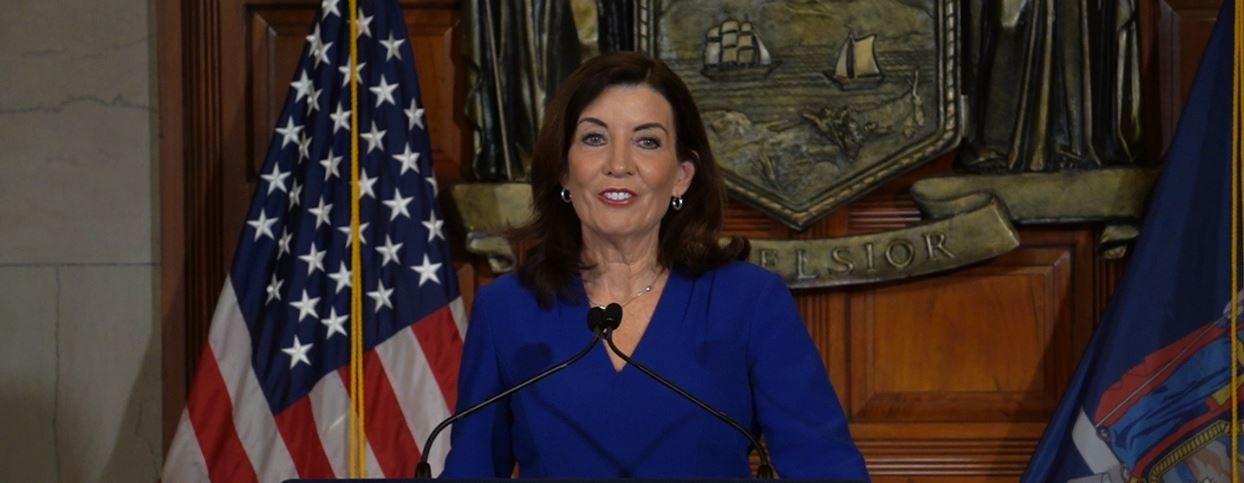New York Gov. Kathy Hochul said Wednesday that the state is prepping for a possible new surge of COVID-19 this fall, but she said no rules like indoor masking are anticipated right now.
The governor also said she's commencing a long-promised study of the state’s past pandemic policies.
The first COVID-19 briefing in several weeks featured Ashish Jha, the White House coronavirus response coordinator. He said the current coronavirus variant, known as BA.5, accounts for 70% to 80% of all cases reported and is highly contagious. It can also re-infect someone who has already had it.
But he said many tools exist to help control the spread and severity of the virus, including the second round of booster shots that are now available.
“If you are over 50 years of age, and if you have not gotten a COVID shot this year … you need to go out and get one now,” Jha said.
Jha said a new vaccine that specifically addresses omicron and its subvariants will likely be available by autumn.
Hochul said she is also gearing up for the fall, when cases could spike once again. She said she's launching a “military-style” operation for both short-term and long-term planning, if the pandemic should again worsen.
Steps include stockpiling personal protective equipment and distributing 3 million test kits to all of the state’s school districts, so they can begin testing on the first day of school.
Hochul said for now, no masks will be required in schools or any indoor settings.
“We don’t currently, based on today’s numbers, anticipate the need for masks in classrooms,” said Hochul. “But I’m going to reserve the right to return to this policy.”
The governor said she is keeping her emergency authorization powers for now, so that she can act swiftly in case new public health rules need to be imposed, or if the National Guard needs to be deployed again to hospitals and nursing homes.
Hochul's political opponents have criticized her for delays over the start of a comprehensive review of the state’s pandemic policies since early 2020.
The governor announced Wednesday that a request for proposals is being posted to create an independent panel to look at what New York did right and did wrong during the pandemic.
Hochul said New Yorkers need to know “what worked, and what did not work, and why."
The review will include the controversial March 2020 order under former Gov. Andrew Cuomo that required nursing homes to take patients with COVID-19 back from hospitals, a decision that critics say led to many more thousands of deaths of residents and staff.
The deadline for the final report is in six months, which comes after the Nov. 8 elections where Hochul is seeking a full term as governor.
Jackie Bray, the state’s Homeland Security commissioner, will lead the review.
The state is also setting up a hotline for New Yorkers who have COVID-19 to access antiviral medicines. The number in New York City is 212-COVID19; in the rest of the state, it's 888-TREAT-NY.
Dr. Mary Bassett, the state's health commissioner, also gave an update on another virus that is spreading – monkeypox. New York leads the nation in cases, with over 600 people sick.
Bassett said anyone can get the disease, but outreach is centering on the LGBTQ community, as many cases have occurred between men having sexual encounters.
She said monkeypox is harder to catch and spread than COVID-19. It is not airborne but is contracted through skin-to-skin contact. In the over 2,100 cases reported nationwide, no one has died. But Bassett said the illness is unpleasant, with fever and painful pustules that last two to four weeks and can leave permanent scars.
Just like the in the early days of COVID-19 vaccinations, Bassett said there’s a monkeypox vaccine shortage, so for now doses are being limited to those deemed most at risk.
“We do not at this time have (enough) vaccine to provide vaccinations to everyone who wants or needs a vaccine,” Bassett said.
Jha said there are only enough doses for about 50% of those at risk. Just one company in the world makes the vaccines. Jha said he hopes the federal Food and Drug Administration will allow 760,000 new doses to become available within a week, and he said many will be distributed to New York.



